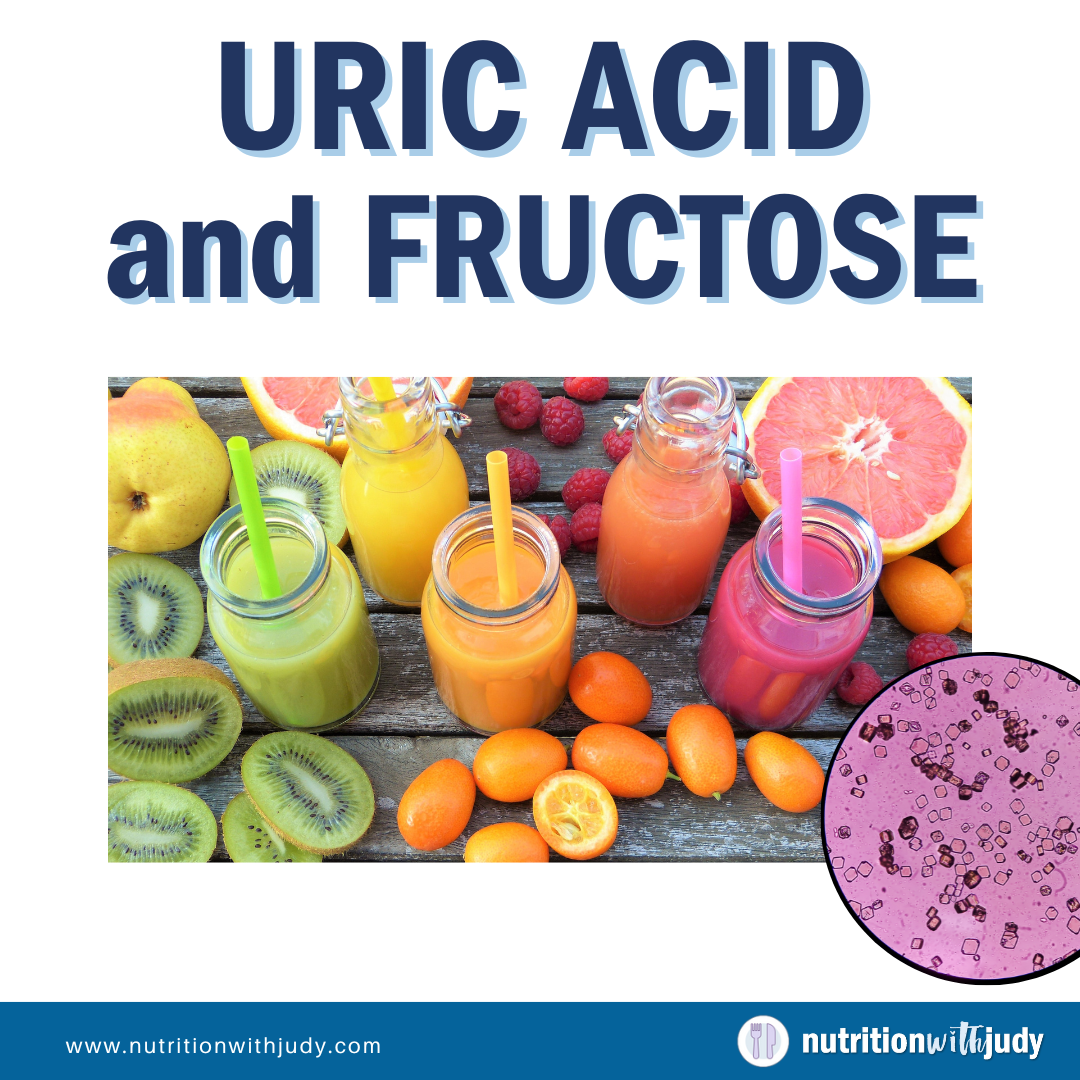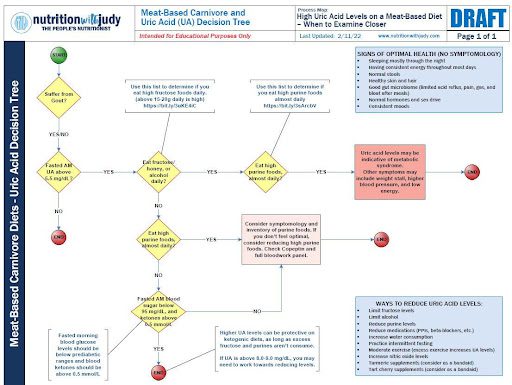

Uric Acid and Fructose


Original Publish Date: 2/5/22
This week I started the discussion of uric acid and how it affects the meat-based community.
The conversation is very nuanced and there are several discussions coming up. Dr. David Perlmutter did a great job explaining the basics of uric acid and how it relates to gout. He also mentions low salt and added fiber which doesn’t necessarily align with our carnivore community.
But that shouldn’t discount the main discussion at hand. For those who consume a lot of protein (purines), fruits/honey (fructose), and alcohol, there is an increased risk of metabolic syndrome.
I tried to explain this in my solo follow-up episode.
If you’re stalling on a carnivore diet and have added liver, fruits, honey, and/or alcohol, you may be stalling your healing.
We must stay open to discussions from all wellness spaces. It helps us to decipher what to learn and what not to learn. We can learn from vegans how incredibly important animal fats and B12 are for health. We can learn from a fiber-friendly Dr. Perlmutter that uric acid (per studies) can be a large culprit for metabolic syndrome.
The brunt of this nuanced discussion for carnivore diets is going to be next week with Dr. Richard Johnson. I attempted to ask him all the nuanced questions that apply to our community but in case I missed some (and I already can think of a few), he’ll be joining me again in March.
Dr. Johnson has published over 700 studies and is a kidney and infectious disease medical doctor. He also continues to see patients while spending time as a professor and father. If you can’t wait, you can start digging into his research studies.
There are tests you can check to see your uric acid status. We talk about them in the interview.
We must always see things in context.
Before you go running to check your uric acid levels, there is nuance for our community.
If you follow a ketogenic carnivore diet with almost no fructose, liver, or alcohol, your uric acid may be high and it likely is a non-issue. Amber O’Hearn wrote about this in 2019 and Dr. Johnson confirmed that ketogenic bodies may be using the higher uric acid levels to upkeep glucose levels (via gluconeogenesis).
Confused?
See below for the NwJ Uric Acid Decision Tree – here’s a quick summary:
1. Do you suffer from gout attacks? If yes or no, keep reading.
2. Is your uric acid above 5.5 mg/dL? If yes, keep reading. If no, then you can stop reading this section.
3. Do you eat liver, brewed teas, chocolate, sardines, alcohol, fruits, and/or honey? If yes, keep reading. If no, check your ketones and blood sugar. If you have ketones (at least above 0.5 mmol/L), you can stop reading this section.
4. Do you consume alcohol, fruit, and/or honey, almost daily? If yes, keep reading. If no, then you may either want to reduce your tea or chocolate (theobromine), sardine, and organ meat amounts, or you can consider a full bloodwork panel and check copeptin. Consider what elevation of uric acid is determined safe (or the UA elevation that you’re comfortable with.)
Dr. Johnson doesn’t recommend anything above 8 mg/dL, whether or not you are in ketosis. Trying to drink more water throughout the day (the interview has more context).
5. If you do consume fruit, honey, and/or alcohol, with your meat-focused diet, you may be stalling your healing, even weight loss.
The higher uric acid levels may not be ideal.
The first thing I’d check is ketones. If you are barely registering any ketones while fasting, I’d get a full bloodwork panel, check copeptin, and possibly get an ultrasound on your liver. I’d stop the fruits and honey, as much as possible.
Just to be clear, there’s no specific amount of organ meats, alcohol, and/or fruit/honey that is safe for everyone, not even children. For some, the answer may be zero.
Consider all things before determining what is and is not safe for your individual body and lifestyle.
I find it interesting that people share the safest plant foods to reintroduce. A lot of it is not evidence-based but we believe it to be true. For example, many of us believe that squashes are safe.
Why?
Where is the evidence-based research?
Squashes are moderate to high in lectins. If you have gut imbalances, you should not be consuming squashes as one of your first reintroduction foods.
Check out the NwJ Insider Tips section below for more info on purines and fructose, so you can do your own inventory of fructose and purine content.
Some people may argue that Dr. Johnon’s research includes rodent studies but listen to him talk about the parafeeding study. He also mentioned studies that Dr. Robert Lustig has done on hypocaloric diets with and without fructose. The children eating fructose still showed disease within the body, even if outwardly they maintained or lost weight.
Some people argue that it’s the high levels of PUFAs causing all the issues of humans metabolizing fructose.
Since there are really no studies that show an absolute reduction of PUFAs, what I can tell you is that clients who eat zero PUFAs for over a year are not metabolically healed.
My mother, for example, is allergic to chicken (so she says) and barely eats pork. She eats almost exclusively beef with some supplementation and fish.
My mother eats almost zero PUFAs. After 3 years of being on a nearly strict carnivore diet, she still cannot have more than one fruit (otherwise, her blood sugar skyrockets). She’s taken the recommended vitamin E and other mitochondrial support recommendations from the PUFA advocates.
So what’s going on with her?
Theory is great until you see things differently in practice.
Her healing has been from removing all carbs and focusing on fatty meats. She is 70 years old and does not take any hormone or thyroid medications. I’d like to understand how her thyroid levels are normal when her insulin is on the lower side.
I’d also like to understand how we came to believe that squashes were one of the safest foods to reintroduce to a meat-only carnivore diet.
Carnivore Diet Uric Acid Decision Tree
I promised a decision tree last week. So for the first time since my management consulting days, I opened up MS Visio and put my thoughts on paper. It was very nostalgic as it reminded me of my late hours working on corporate projects (but for a paycheck). I now do this for clients but it’s more than worthwhile.
Learn more about uric acid with our free handout.
Dr. Johnson’s video was pretty powerful for our meat-based community and I hope you had a chance to watch it this week. It’s available on YouTube and all podcast platforms.


You can find the full decision tree as a PDF. I marked it as a draft as I plan to vet this with Dr. Richard Johnson. Remember, this is not medical advice.
Check last week’s newsletter for a deeper discussion about uric acid. There are nuances with higher uric acid levels when you are following a ketogenic diet. Just to be clear, meat and lots of fruit, honey, and/or alcohol are not ketogenic. You are likely not producing enough ketones to be in a ketogenic state.
Follow the decision tree and consider all things before determining what is and is not safe for your individual body and lifestyle.
In health,
Judy




John Fazio
February 14, 2024 at 10:05 amI am a gout sufferer and cannot break through with either keto or carnivore. No matter how strict or purist I am, my uric acid spikes into the double digits (my fasting blood glucose does settle in the low 80’s). The end result is chronic gout, the longest I could push to see if I could break through was around 90 continuous days. My go to U.A. reset is a raw milk only diet which brings it down into the 3s within a week but my blood glucose then hovers around 100. I appear to be one of the unfortunate few where either a raw milk cleanse, keto, or carnivore does not heal my underlying metabolic dysfunction. Whole point is to just to give an example for any searching gout sufferers that keto/carnivore may not be the solution and that there are those it didn’t help. Good luck, I understand the struggle.